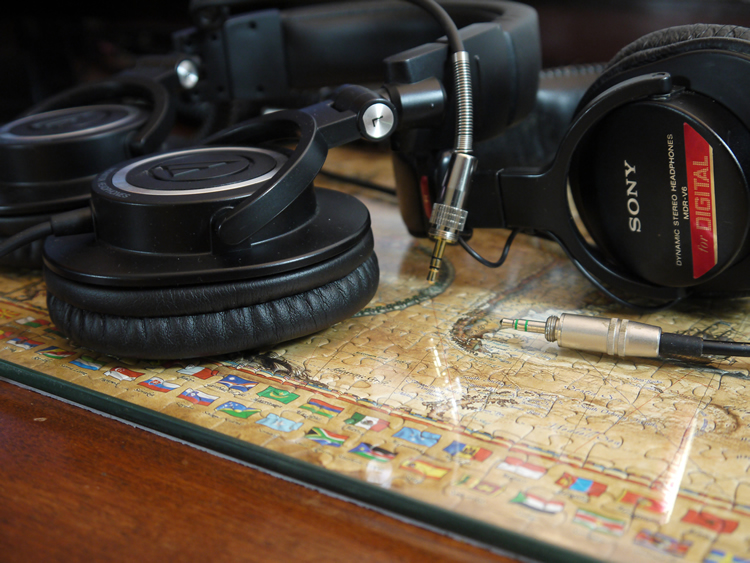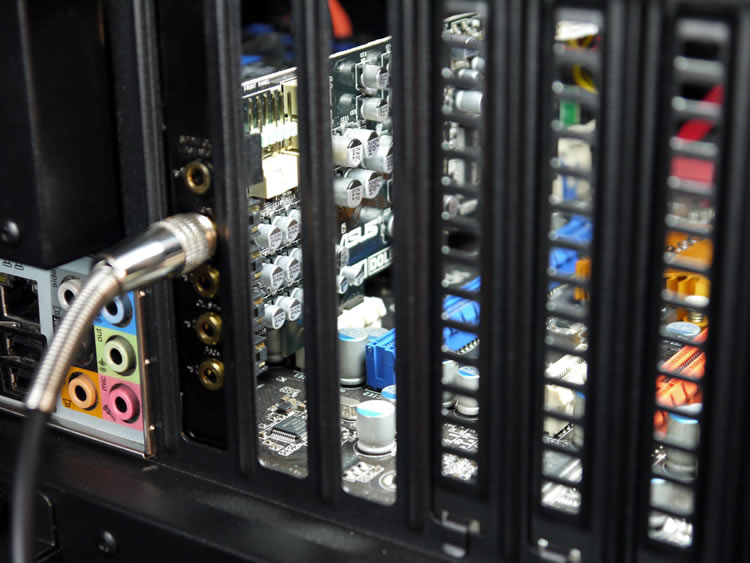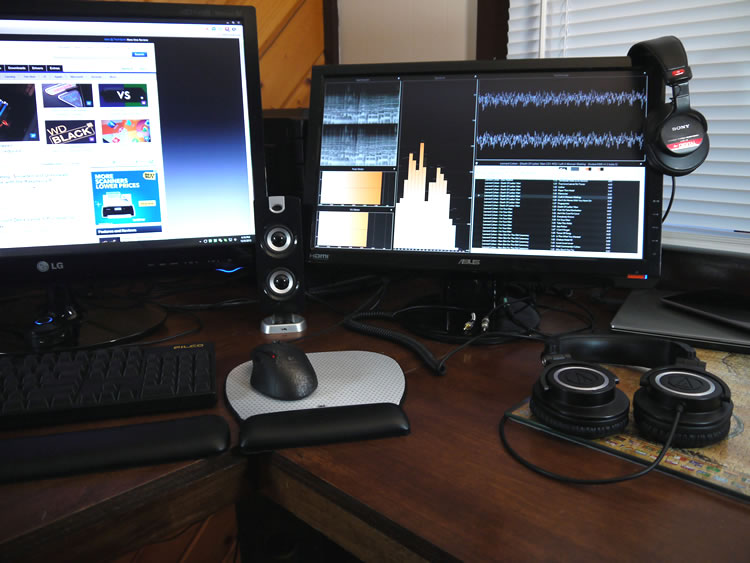Should You Buy a Sound Card? An Enthusiast's Perspective
I've been on the fence about buying a discrete sound card since building my first PC in 2002. The equation for buying most desktop parts is pretty straightforward: a graphics card can handle your games or it can't, a hard drive has enough storage for your data or it doesn't, memory is compatible with your platform or it isn't, and a chassis can accommodate your hardware or it can't. Audio gear is trickier.
There's no clear-cut metric to use as a guideline if you're shopping for a sound card. Lengthy audiophile reviews are available, but they generally don't offer a quantifiable takeaway if you have a limited point of reference and don't know much about the subject to begin with. I fall into that category. I've never had anything except onboard sound and my knowledge of acoustics couldn't fill a thimble.
From that position, buying a sound card has always felt more like a gamble than an investment. At the same time, I know audio snobs with thousands in equipment and all-FLAC libraries, and I'd like to believe they aren't delusional – surely there's something to be experienced beyond my basic setup. But I mean, just how much better can music, movies and games sound? Enough to prevent buyer's remorse?

I know I'm not the only one to ask those questions considering how many forum threads I've seen debating the necessity of a sound card. After more than a decade, I hope to learn the answer and pass it along to other folks who are hesitant about taking the plunge. To make this as useful as possible, I bought a popular mid-priced card that a typical enthusiast would likely opt for: the $80 Asus Xonar DX.
...buying a sound card has always felt more like a gamble than an investment.
To be clear, this isn't an in-depth look at the Xonar DX or any other product. Instead of hitting you with a bunch of numbers, I plan to toggle between my Asrock's onboard audio and the Xonar in various tests and describe the quality differences – if any – in plain English, to the best of my ability. In other words, you're about to endure some crudely subjective findings but I'll try to make them helpful.
Note:This feature was originally published on 12/03/2013. We have revised it and bumped it because it's as relevant today as it was before. Part of our #ThrowbackThursdayinitiative.
Xonar DX vs. Realtek
As with choosing a sound card, we figured it would be most practical to pick a headset that's nice, but not second mortgage nice. Audio Technica's ATH-M50 seemed like the best compromise between price and performance – it certainly has enough positive reviews, and I'd be pretty disappointed if I couldn't detect a difference between integrated and discrete audio outputs with $150 headphones.
Besides spending hundreds of hours with each device separately, I directly compared them across many songs (FLAC files mostly) and games (primarily Team Fortress 2 and Dirt 3). I didn't spend much time adjusting software effects so both the onboard chip and the Xonar DX ran with a preset "rock" equalizer because it's been my go-to setting for years and it's what I'm familiar with hearing (more on this later).

I had initially planned on listening to a few songs all the way through on each device several times, noting when inconsistencies appeared. This proved challenging though because by the time I reached the end of a five minute track I forgot what the start sounded like. That made it impossible to judge the outputs fairly, but the more I listened the less I questioned whether the Xonar sounded better.
I eventually decided it would be more effective to compare memorable 30-second segments instead and this immediately highlighted quality variances. If I start by listening to the Xonar and then switch to the Realtek I sometimes assume certain sounds are missing. I don't think that's generally true, it's just that some of them are less clear and require more focus to hear when using the onboard solution.
Similarly, as I transitioned between configurations it often felt like the Realtek was quieter, but I don't believe this is the case either. Everything is simply duller. Sharp voices and instruments sound muted and increasing the volume doesn't help. As a quick example, the fluttering electronic sound between 0:42 and 1:03 of Fluke - Zion is very underwhelming at its climax when using the Realtek.
The heavy bass shortly thereafter is also lacking enough oomph that I can literally feel the difference. In fact, when I later tested with Cyber Acoustics' speakers, the Realtek's bass sounded so off in Zion that I double-checked the cable's connection. If I listen closely enough, the above findings are true across artists, genres and bitrates. The Xonar sounds more substantial in seemingly every song, game or movie.
In a sense, it feels like the bass and treble are arguing for my attention, which gives them less individual presence. It's not purely about higher highs and lower lows. The discrete audio is more convincing. Whether I'm flipping cars in Dirt 3, traversing Skyrim's tundra, rocket jumping to a control point or playing a live recording, the Xonar DX sounds more along the lines of what I would expect if I were actually there.
...but the more I listened the less I questioned whether the Xonar sounded better.
This is at least partly because everything sounds more open. It's easier to visualize myself in the middle of a large, dynamic environment. For instance, in Dirt 3 the Xonar reports locations of other racers and debris better while many noises such as shouts from onlookers seem to be more distinct and audible for a bit longer. The limitations of my onboard chip are particularly noticeable in Team Fortress 2.
With the Realtek, battles sound like they're unfolding behind a mountain even when I'm in the thick of things and despite being less forceful, nearby explosions manage to eclipse effects. Whether gibbed remains scatter ahead or someone yells for help behind, the Xonar includes them as part of the chaos. I wouldn't go as far as claiming that it improves my score, but it certainly enhances the experience.
What about XYZ...?
You mean you didn't configure the software?!
I've used the "rock" equalizer with my PC's integrated audio (and just about every other sound device) for as long as I can remember. I care about audio quality, but not enough to tweak an equalizer between genres or media types. I didn't hesitate to do the same with Asus' sound card and I'm generally content with that decision, but out of curiosity I did test some other software settings with each device.
I'm confident that my configuration could be refined to get more out of this gear and there are definitely times where I've found it beneficial to match the card's preset effects with whatever's playing. Changing the equalizer from "rock" to "classic" is often worthwhile if you're listening to a piano instead of a guitar, and that's not something I can say for the Realtek, which is why I've always set it and forget it.
What about cheaper headphones or speakers?
I also compared the discrete and integrated audio outputs using Sony's MDR-V6 ($60), Cyber Acoustics' CA-3602 ($40) and a cheap pair of Philips earbuds ($20). Two things stood out: there is definitely a quality difference between both sound outputs when running lossless files on all of the noted devices, and the MDR-V6s don't sound like they cost half as much as Audio Technica's ATH-M50s.
It's worth mentioning that the left earbud stopped working days before testing and the US holiday prevented new ones from arriving in time for testing. That said, listening with half of a $20 headset didn't make it any harder to spot the biggest disparity: the Realtek's audio sounds like it's filtered through wet towel while the Xonar's seems comparably unobstructed, and that holds up across the board.
Get with it... I stream all of my music!
I use Google Music, SoundCloud, and YouTube among other services to discover new artists and some days I stream more tracks than not. Of course, I don't regret having the Xonar around at those times, though if something is transcoded to hell it's only that much more disappointing to hear with a discrete card. If nothing else, it's made me a little more conscious about maintaining the quality of my own library.
Okay, so how much does bitrate matter?
I'm not sure. I've tested songs at varying compressions and heard undeniable improvements with the Xonar when shifting from 128kbps to 256kbps and up, but I haven't noticed any convincing changes between 256kbps or 320kbps MP3s and FLAC rips. Maybe I can't hear them with $200 worth of audio equipment or perhaps I just don't know what to listen for. Either way, I'm sticking with MP3s for now.

Did it take long to switch between devices?
Nope. Only a few seconds passed between hearing each output. I bought extension cords for both of them so I didn't have to reach behind my computer every time I needed to unplug wires and so on. I also used an AutoHotkey script to toggle between the Xonar DX and Realtek with a quick keyboard command, and I set keyboard shortcuts in Foobar2000 to skip through tracks easily and compare certain spots.
Your frame rates must be off the charts now!
If they are, I haven't noticed. A sound card may lighten your CPU's load, but that hasn't translated to conventional performance gains – definitely not in a consistently meaningful way. PassMark's 15-minute BurnInTest recorded nearly identical results on both setups with the fraction of an advantage actually leaning in the Realtek's favor. Far Cry 2 and Dirt 3 didn't benefit either, though neither are CPU-intensive.
Should my PC have a sound card?
That's still debatable. For the money, there's no doubt some folks would benefit more from a new graphics card, flash drive or anything else with a tangible performance gain. Hell, if you were careful enough, you could buy both a mainstream GPU and SSD for about the same price as the Xonar DX and ATH-M50s, which would probably make you happier if you're stuck with Intel graphics and a disk drive.
Even if you have a high-end GeForce and an uber fast 1TB SSD, you might simply not care about audio quality. I know someone who's fine with playing CDs of music downloaded off YouTube, but maybe they just need to hear the difference. I was happy with the Realtek for years and while I can still adapt to the lower fidelity audio, it's a weird balance between appreciating what I have and knowing what I'm missing.

You could argue that I might value higher quality audio because I work from home with music rolling around the clock, but I don't think it matters whether you spend eight hours a day or one hour a week on your computer. If it were the latter, I'd suggest that someone with such few opportunities to enjoy a good song or game may want to experience those things at their best – or at least better than average.
The sounds from my integrated chip bleed together. Muddy, shallow and flimsy are all fair descriptions of the Realtek's audio, while the Xonar DX is comparably crisp, open and punchy. Shifting from low to high-resolution video seems like an apt comparison as it often feels like I'm moving from 480p to 1080p or perhaps 1080p to 4K, the latter of which our LA-based editor Rick will be covering in a review soon.
Should you buy a sound card? Maybe not, but I think the average enthusiast rig deserves one. If you can appreciate and afford the upgrade, I'm not sure why you wouldn't do it – barring ignorance, as in my case. Discrete audio isn't snake oil, yet it's not a necessity either, so I wouldn't prioritize it over a stable power supply or a comfortable keyboard. But I also wouldn't want to spend another decade without it.
本文地址:http://signalforexgratis.com/signal-forex-gratis-hari-ini-tanggal-04-maret-2014/
版权声明
本文仅代表作者观点,不代表本站立场。
本文系作者授权发表,未经许可,不得转载。